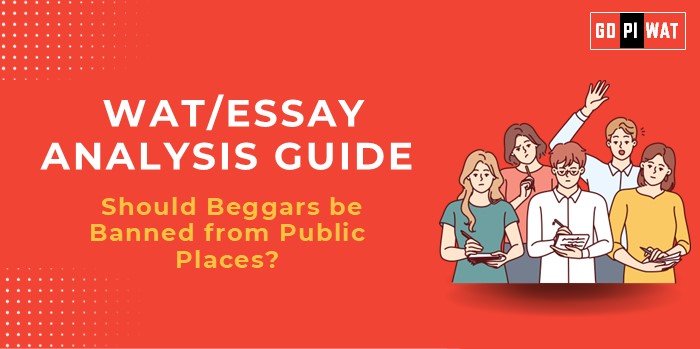📋 Should Beggars be Banned from Public Places?
🌐 Understanding the Topic’s Importance
This essay addresses critical issues of poverty, human rights, and public order. Banning beggars from public areas brings forward ethical, legal, and social implications, relevant to discussions on corporate social responsibility and public policy in B-schools.
📝 Effective Planning and Writing
- ⏱️ Time Allocation:
- Planning: 5 minutes
- Writing: 20 minutes
- Review: 5 minutes
- 📚 Preparation Tips:
- Identify relevant statistics and stakeholders.
- Reflect on ethical considerations and potential social implications.
💡 Introduction Techniques for Essays
- ✍️ Contrast Approach: “While some view beggars as an eyesore in public spaces, others see them as individuals reflecting society’s economic gaps. This contrast raises important questions about the ethics and effectiveness of banning them from public places.”
- 💡 Solution-Based Introduction: “As cities struggle to balance public order and social welfare, the question of banning beggars offers insight into society’s approach to poverty and compassion.”
- 📖 Timeline Approach: “From historical associations with poverty to recent regulations, the presence of beggars in public spaces has led cities globally to consider bans, underscoring complex socio-economic dynamics.”
📖 Structuring the Essay Body
- 🏆 Achievements:
- Highlight welfare programs, such as government housing or employment schemes, and their positive impact on reducing begging.
- ⚠️ Challenges with Comparative Analysis:
- Discuss the limitations of such bans, referencing examples from cities where bans either succeeded or failed based on their social support systems.
- 🔮 Future Outlook:
- Suggest integrating comprehensive rehabilitation initiatives, with public-private partnerships to ensure long-term success.
🎯 Concluding Effectively
- ⚖️ Balanced Perspective: “While banning beggars may improve public order, the need for rehabilitative and poverty alleviation programs is paramount to addressing root causes.”
- 🌍 Global Comparison Conclusion: “Cities worldwide show mixed results on bans; success often correlates with strong social welfare backing, suggesting that sustainable policies must address both immediate and long-term needs.”
📊 Analyzing Successes and Shortcomings
- ✅ Key Achievements: Improved public order and tourism, government social welfare programs.
- ⚠️ Ongoing Challenges: Persisting poverty, ethical implications of bans, inadequate rehabilitation resources.
- 🌍 Global Context: Countries with strong social support see better outcomes when integrating bans with comprehensive welfare.
🔧 Recommendations for Sustainable Progress
- 📜 Community Rehabilitation Programs: Partner with NGOs to provide training and employment opportunities for beggars.
- 🌱 Targeted Welfare Schemes: Introduce schemes to directly support homeless individuals and address root causes of poverty.
- 📣 Public Awareness Campaigns: Educate the public on ethical responses to begging and support for rehabilitation.
✍️ Sample Short Essays on the Topic
- ⚖️ Balanced Perspective: “The sight of beggars in public spaces reflects a deeper socio-economic issue. While a ban may offer temporary relief for urban aesthetics, true progress lies in addressing poverty through rehabilitative and social welfare programs.”
- 💡 Solution-Oriented: “A ban on begging without robust support systems may fail to yield results. Instead, cities should consider policies focused on vocational training and poverty reduction for a sustainable solution.”
- 🌍 Global Comparison: “Cities like Oslo that restrict begging also offer strong welfare support, suggesting that success depends on coupling bans with comprehensive social safety nets.”


